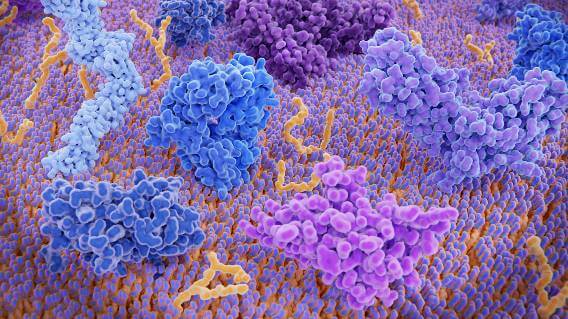New Mesothelioma Immunotherapy Clinical Trial Opens at MD Anderson
Research & Clinical TrialsWritten by Tim Povtak | Edited By Walter Pacheco

The acclaimed MD Anderson Cancer Center in Houston is opening a phase II clinical trial involving a new immunotherapy drug aimed specifically at advanced, rare cancers, including both pleural and peritoneal mesothelioma.
This single-institution clinical trial will be measuring the safety and effectiveness of vudalimab, also known as XmAb20717, which was designed by the California-based biopharmaceutical company Xencor.
Vudalimab’s uniqueness stems from its ability to block the activation of cell surface proteins PD-1 and CTLA-4 – which stop the immune system from working properly – and it promotes T-cell activation that targets tumors.
“The hope [with this trial] is that we can show better efficacy, improved response rate and a more durable response for patients than what we see now,” medical oncologist Dr. Arvind Dasari, clinical trial principal investigator, told The Mesothelioma Center at Asbestos.com. “We want to build on what is already out there with immunotherapy and make it better.”
Vudalimab Could Be More Versatile than Opdivo/Yervoy
Researchers believe vudalimab may be able to duplicate the methodology and improve upon the effectiveness of the immunotherapy combination of Opdivo and Yervoy, but with fewer side effects as a single agent. The U.S. Food and Drug Administration approved the Opdivo/Yervoy combination in 2020 as a first-line treatment for unresectable pleural mesothelioma.
As immune checkpoint inhibitors, Opdivo targets the PD-1 cell surface protein and Yervoy targets CTLA-4. Vudalimab alone has shown an ability to target both as a dual blockade agent, the first of its type being touted for mesothelioma treatment.
“The idea is benefiting patients, controlling their cancer and making sure to not adversely affect quality of life with more toxicities,” Dasari said. “For so long there have been only limited options for patients with mesothelioma. We are finally making progress now.”
The earlier phase I clinical trial of vudalimab was spread across a dozen different locations and focused on finding the optimal dosage level, along with ensuring the safety and tolerability for future patients.
“Preliminary data was associated with complete and partial responses in multiple tumor types and was generally well tolerated,” wrote the authors of the phase I trial in Journal for ImmunoTherapy of Cancer. “These findings support further development of vudalimab in advanced solid tumors.”
MD Anderson Specializes in Mesothelioma
MD Anderson, selected to move the drug into phase II, has been ranked the No. 1 Cancer Hospital in America for the past seven years by U.S. News and World Report.
Dasari will be working closely with the center’s mesothelioma specialists, Dr. Anne Tsao and Dr. Raghav Kanwal.
MD Anderson currently has six different phase II clinical trials involving immunotherapy that are available to patients with mesothelioma. One of them is measuring the feasibility of Opdivo and Yervoy injections for patients in combination with mesothelioma surgery.
This latest clinical trial is hoping to enroll 140 patients, including 20 with peritoneal mesothelioma and 20 with pleural mesothelioma, and hopes to establish the efficacy of vudalimab.
“Immunotherapy is one of the keys for improving treatment of mesothelioma, and dual checkpoint inhibition may be part of that,” Dasari said. “Recent data has really shown a compelling need for immunotherapy, and we are building on that.”
Both previously treated and untreated patients with mesothelioma disease are being accepted into the clinical trial. Also being accepted are select patients with small cell lung cancer, Hodgkin lymphoma, cervical carcinoma, neuroendocrine carcinomas and microsatellite high cancers.
Patient will receive the drug intravenously on days one and 15 of each cycle of treatment. Blood and tissue samples will be collected to help determine exactly what works, and why.
“This is a first step. We’ll see how big, or how small, that step is. And it’s not the last step, by any stretch. We’ll improve on what we’ve done, and what we’re doing now,” Dasari said. “We’ll learn from every single patient in the trial and learn what we can do better. We have a vision for the future. This is part of that vision.”






